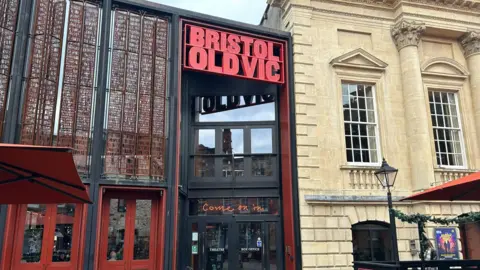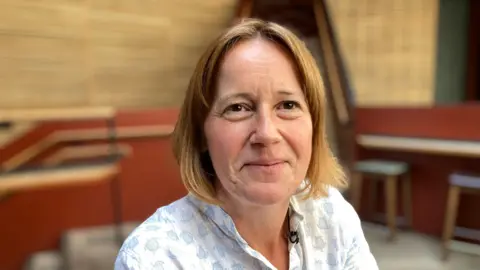
 BBC
BBCBristol Old Vic says it is reviewing the number of shows it can put on next year, as it tries to balance its books.
The venue on King Street, which is the country’s oldest continuously-working theatre, is in its fourth year of losses.
The chief executive said funding it receives from Arts Council England has not kept up with inflation, and rising costs are also to blame.
Arts Council England said Bristol Old Vic has received more than £11.2m in public funding over the last six years. The government says it’s looking into how it funds arts organisations.
‘Loss-making position’
Bristol Old Vic ticket sales are up a third on last year. It recently staged a successful run of Starter for Ten starring Mel Giedroyc and Child of Science, with Tom Felton. But despite that, the venue isn’t breaking even.
Charlotte Geeves, the chief executive of the Bristol Old Vic, said: “We haven’t been able to break even over the last three years and this year is our fourth year of going into a similar loss-making position.
“And that is just due to costs rising. People costs rising mostly, also energy costs rising, material costs rising. It is the same as every sector across the board.”
Ms Geeves said the majority of adjustments made so far have been operational and staffing, but if it continues to operate at a loss, it will need to review its shows.
“This year we are having to start to look at what activity we will be able to continue doing if we continue to make losses, and that includes shows,” she added.
“Other activity that we may have to curtail will affect young people and communities, and potentially some of the work that we do with the freelance artist community outside of the shows.”
About 19% of the venue’s income comes from Arts Council funding. The rest comes from box office sales, food and drink purchases, as well as building sets for other productions and shows that end up in the West End.
The venue also no longer receives funding from Bristol City Council, after its unsuccessful bid for funding from the cultural investment programme last year.

Independent cinema and multi-arts venue Watershed is also forecasting a loss this year, of about £100,000.
“About 15% of our income comes from Arts Council funding,” said Clare Reddington, CEO of Watershed.
“Although that sounds quite small, it is also the most flexible part of our income. It underwrites our ability to try new things, to take risks and support other people in the city.
“The cost of everything is going up – the cost of electricity and gas is really hitting us. Watershed pays real living wage because it is really important to pay people fairly, and that went up 10% this year.
“But we can’t really put our ticket sales up because people can’t afford it. It means that we have to spend lots more time thinking about profitability, thinking about margins, thinking about where else we can get that money from.
“We’re likely to lose maybe £100,000 this year. We are trying really hard to fundraise instead of cut things that we think are really important to the city.”
Continued investment
Arts Council England said it has awarded Bristol Old Vic more than £11.2m in public funding since 2018, and Watershed more than £6m.
For the 2024/25 year, the venue has received £1,250,000 from Arts Council England.
A spokesperson said: “We’re proud to currently support 22 National Portfolio Organisations in the city, including Watershed, Bristol Old Vic, the iconic SS Great Britain, groundbreaking Paraorchestra, and the recently refurbished Bristol Beacon.
“The Arts Council is not in a position to fill funding gaps, but we will work closely with the council to support continued investment, and we have made it clear to our funded organisations who may be experiencing financial challenges that we will be as flexible as we can be in the way they deliver on their funding agreements with us.
“Our focus is to make the case for investment in creative professionals and cultural organisations, and to identify opportunities for the sustained development of our cultural sector.”
The Department for Culture, Media and Sport said a review into Arts Council England funding was paused during the election, but ministers will consider next steps in due course.
A DCMS spokesperson said: “We are committed to ensuring that creativity and culture is for everyone, not just the privileged few.
“The government will consider how we fund arts organisations in this country, including how we can attract funding from different sources and we will also ensure that every child has access to high-quality creative education.”



Be the first to comment